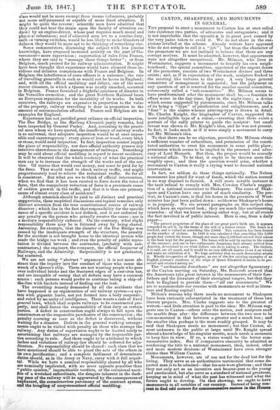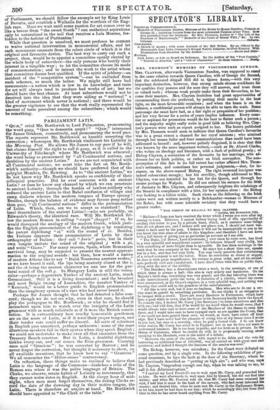CAXTON, SHAKSPERE, AND MONUMENTS IN GENERAL.
THE proposal to erect a monument to Caxton has at once called into existence two parties, of advocates and antagonists; and it is not improbable that the oppositicn is in great part caused by the very pains taken to avoid it. We do not share in the sus- picions levelled at the scheme. Already writers have appeared who do not scruple to call it a "job" ' • but from the character of the promoters we are not inclined to believe that there are any corrupt motives. It must be admitted, however, that appearances were not altogether unequivocal. Mr. Milman, who lives in Westminster, suggests a monument to beautify his own neigh- bourhood ; the special committee, appointed at the urgent desire of the promoters, consists of two Westminster divines and three artists ; and, as if in expectation of the work, sculptors flocked to the meeting like vultures to the prey. A very large general committee of management is appointed ; but the judgment on any question of art is reserved for the smaller special committee, erroneously called a "sub-committee." Mr. Milman seems to have predetermined what the monument shall be,—a fountain to effuse water in the day-time, light in the night-time ; a device which seems suggested by paronomasia, since Mr. Milman talks of its being a "type" of purification and enlightenment, and a "font" is the source whence printing-type is drawn in detail. Mr. Charles Knight, the biographer of Caxton, suggested the more intelligible type of a statue,—averring that there exists a portrait of the early printer to guide the sculptor: but small favour was shown to Mr. Knight's idea, and he was not present. In fact, it looks much as if it were simply a movement to carry out Mr. Milman's idea.
To that there can be no objection, provided Mr. Milman obtain a sufficient number of subscribers, and permission of the consti- tuted authorities to erect his monument in some public place; permission which seems to be implied in the presence and advo- cacy of Lord Morpeth. But then, the project would be scarcely a national affair. To be that, it ought to be thrown more tho- roughly open ; and then the question would arise, whether a monument to Caxton is really a crying want to demand national intervention.
In fact, we seldom do these things nationally. The Nelson monument has pined for want of funds, which the nation seemed in no way disposed to furnish. A still more notable instance is the tacit refusal to comply with Mrs. Cowden Clarke's sugges;- tion of a national monument to Shakspere. The cases of Sh.ak- spere and Caxton have one point of much similarity. The_pre- text, in Caxton's case, is that his house in the precincts of West- minster has just been pulled down : so likewise Shakspere's house is in jeopardy. We see several paragraphs on this subject also, which have an equivocal look ; they are much like auctioneering inuendos : of that we know nothing either way, but at all events i the fact involved is of public interest. Here s one, from a daily paper- " The present proprietors of the place of our great poet's birth are, it appears, compelled to sell it, by the terms of the will of a former owner. The house is a freehold, and is valued at something like 2,0001. This valuation has been forited on the number of visiters. In 1846 it was calculated that something like 3,000 people had visited the house, though not more than 2,500 had entered their names in the book kept for the purpose. The house will be sold by auction in the course of the summer; and one or two enthusiastic Jonathane have already arrived from America, determined to see what dollars can do in taking it away. The timbers, it is said, are all sound, and it would be no very difficult matter to set it on wheels and make an exhibition of it. We hope and trust that no such desecration awaits it. Wholly irrespective of Shakspere, as one of the few existing examples of an English yeoman's residence of the reign of Queen Elizabeth it merits to be pre- served and retained among us."
The "enthusiastic Jonathans" are not altogether figmentary : at the Caxton meeting on Saturday, Mr. Bancroft avowed that the Americans take great interest in the monuments of their fore- fathers and the literature of their aboriginal tongue, but that they look to England to provide them—" all our monuments." We are to accommodate our cousins with monuments as well as litera- ture and floating capital I Milton's reasons why there needs no monument to Shakspere have been curiously substantiated in the treatment of these two literary projects. Mrs. Clarke suggests one to the greatest of writers—and little attention is paid to the idea: Mr. Milman sug- gests one to Caxton—others seize the notion, and sculptors snuff the marble from afar : the difference between the two men to be commemorated is that between a greater and a much less ; and the smaller idea perhaps is the more readily grasped. It may be said that Shakspere needs no monument ; but that Caxton, al- most unknown to the public at large until Mr. Knight spread abroad a knowledge of his singular merits, much needs a memento to keep him in view. If so, a statue would be the better com- memorative index. But if comparative obscurity be admitted as conferring the title to a national monument, then, indeed, other and more modern denizens of Westminster have even stronger claims than William Caxton.
Monuments, however, are of use not for the dead but for the living. They serve as an authoritative testimonial that some de-
parted man is to be admired—that his acts were glorious ; and thus
they not only act as an incentive and beacon-post to the young and uneducated, but also serve as a standard of national greatness, keeping us in mind of what the past has witnessed and what the future ought to develop. On that showing, we ought to have monuments to all notable* of our country. Instead of being con- tent to-ltud ald earners foroommemorative swats in the Houses
of Parliament, we should follow the example set by King Louis of Bavaria, and establish a Walhalla for the worthies of the Eng- lish race. Must we wait until some passion for art comes over us like a breeze from "the sweet South" t can assthetical aspirations only be naturalized in the soil that receives a Lola Montez, for- bidden to the habitat of Puritanism?
While that question is unsolved, we must perforce be content to waive national intervention in monumental affairs, and let each monument emanate from the select circle of which it is the original and favourite device. The best way to carry out such a project, then, would be to appoint a committee openly elected by the whole body of subscribers—the only persons who testify their interest in a tangible way ; to let the committee choose its mode of commemoration ; and to intrust the work to the artist whom that committee deems best qualified. If the spirit of jobbery—an incident of the "competitive system"—can be excluded from such schemes, so much the better. We might still have bad monuments—a nation which is low in its knowledge and taste for art will always tend to produce bad works of art ; but we should have the best chance. At least subscribers would not be deceived into the idea that they were aiding as " national " a kind of movement which never is national ; and there would be the greater vigilance to see that the work really represented the amount of taste prevalent among the subscribers ; which would be something.



























 Previous page
Previous page